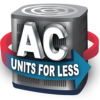If your furnace keeps turning on and off frequently, you're likely experiencing a common issue known as short cycling. Not only can short cycling disrupt the comfort of your home, but it can also increase energy costs and strain your heating system. Understanding the causes and solutions can help you resolve the problem effectively.
What Is Short Cycling?
Short cycling occurs when a furnace turns on, runs for a short period, and then shuts off before completing a full heating cycle. Instead of maintaining a consistent temperature, the furnace repeatedly starts and stops, leading to inefficiency and potential wear and tear.
Common Causes of Short Cycling
-
Dirty Air Filters
- A clogged air filter restricts airflow, causing the furnace to overheat and shut off as a safety measure.
- Solution: Check and replace the air filter every 1-3 months, especially during peak usage seasons.
-
Thermostat Issues
- Incorrect thermostat settings or a malfunctioning thermostat can cause the furnace to turn on and off irregularly.
- Solution: Ensure your thermostat is set to the proper temperature and mode. Replace batteries or recalibrate if needed.
-
Oversized Furnace
- An oversized furnace heats your home too quickly, leading to frequent shut-offs and uneven heating.
- Solution: Consult an HVAC professional to evaluate the size of your furnace relative to your home's needs. Replacement may be necessary.
-
Blocked or Closed Vents
- Restricted airflow due to blocked or closed vents can cause pressure buildup, forcing the furnace to shut off prematurely.
- Solution: Ensure all vents are open and unobstructed by furniture, curtains, or other items.
-
Malfunctioning Flame Sensor
- The flame sensor monitors the burner’s flame. If it's dirty or faulty, the furnace may shut down for safety reasons.
- Solution: Clean the flame sensor or have it replaced by a professional.
-
Overheating
- Internal overheating can trigger the furnace’s safety mechanisms to shut it off. This is often caused by poor airflow or mechanical issues.
- Solution: Check for blocked vents, dirty filters, or problems with the blower motor. Professional servicing may be required.
-
Low Airflow or Blower Issues
- If the blower motor is failing or the fan is obstructed, the furnace may not distribute heat properly, leading to frequent cycling.
- Solution: Inspect the blower and motor for damage or debris, and call an HVAC technician for repairs.
-
Gas Supply Problems
- Insufficient or inconsistent gas supply can cause the furnace to shut off intermittently.
- Solution: Check your gas line for leaks or blockages and contact your gas provider or a professional for assistance.
Why Is Short Cycling a Problem?
- Increased Energy Costs: Frequent cycling consumes more energy, driving up your utility bills.
- Reduced Comfort: Short heating cycles fail to distribute warmth evenly throughout your home.
- Wear and Tear: Continuous starting and stopping strains furnace components, potentially leading to costly repairs or premature replacement.
How to Prevent Short Cycling
- Schedule regular HVAC maintenance to keep your furnace in optimal condition.
- Replace air filters regularly to ensure proper airflow.
- Use a programmable or smart thermostat to maintain consistent temperatures.
- Ensure vents are open and unobstructed for even heat distribution.
- Have your furnace inspected annually to address potential issues before they escalate.
When to Call a Professional
While some short cycling issues can be resolved with simple DIY steps, others may require professional assistance. Call an HVAC technician if:
- The problem persists despite troubleshooting.
- You suspect issues with the blower motor, gas supply, or electrical components.
- The furnace is older and may need replacement.
Final Thoughts
A furnace that keeps turning on and off is not only inconvenient but also a sign of an underlying issue that needs attention. By understanding the causes and taking proactive steps to address them, you can restore your furnace's efficiency, reduce energy costs, and ensure a warm, comfortable home. If you're unsure about the cause or need expert help, don't hesitate to contact a trusted HVAC professional.


